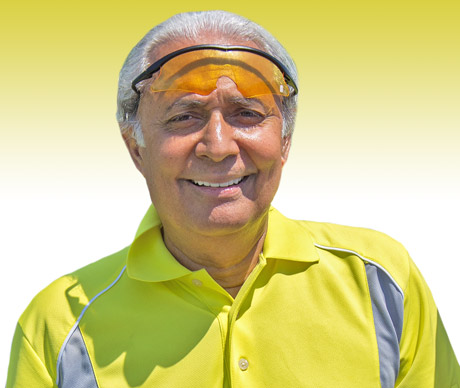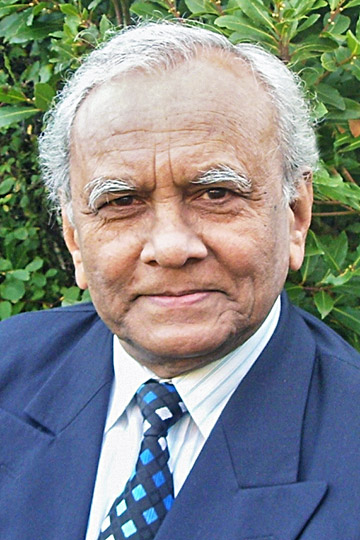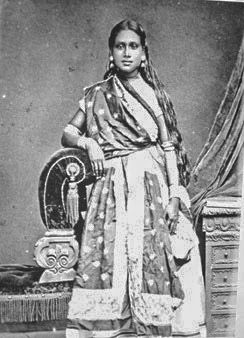Community Connection
may shut them out
Ayush Suvalka has a lot going for him. He's about to graduate from one of the best engineering colleges in India and has already secured a job with the Bangalore branch of JPMorgan.
The 21-year-old computer science student isn't planning to spend his career in India's version of Silicon Valley. He hopes the big American investment bank will move him to its U.S. headquarters after a few years.
"It's always been America because the companies, all the big companies, are there," Suvalka said. "The life there is... really amazing."
President Trump and his desire to put "America First" could throw a wrench in those plans.
The Trump administration is looking to make changes to a host of visa programs, including restricting the H-1B visa that allows thousands of Indian techies to work in the U.S.
White House Press Secretary Sean Spicer said last month that this may be done "through executive order and through working with Congress."
That could spell the end of the American Dream for Suvalka and many of his peers.
"Probably America is now out of the picture," he said.
Some students may also think twice after last week's murder of an Indian tech worker in Kansas. Srinivas Kuchibhotla, who worked for Garmin, was gunned down by a man who reportedly screamed "Get out of my country" before opening fire.
"There are opportunities over there, there are much better facilities," said 18-year-old Divyanshu Saxena, a computer science student at the Indian Institute of Technology (IIT) in New Delhi. "But we would not like to sacrifice our own well-being for that."
U.S. efforts to restrict foreign workers through legislation are already in progress – multiple bills seeking curbs on the H-1B program have been introduced by Republican and Democrat lawmakers this year.
Dr. Savita Rani, head of career counseling at the Ramaiah Institute of Technology where Suvalka studies, says jobs at outsourcing companies are in high demand because of the potential to move to the U.S.
But the possibility of America's doors slamming shut is already sowing confusion among students.
"They were shattered and they did not know what to do," Rani said. "At this juncture, America has got a cold and India is sneezing."
Indians studying engineering in the U.S. may be a step closer to working there, but they're worried too.
"There was a lot of panic among people here," said Kishan Rao, a computer science student at the University of Florida. "I'm feeling a little apprehensive, because everything is up in the air until there's a decision."
Rao, 24, is two months away from graduating with a Master's degree. He eventually wants to return to India, but is hoping for a few years of work experience in Silicon Valley first.
"Right now I'm looking for jobs, but this thing has made it more complicated," he said. "Every company that I apply to relies on the H-1B program, so if there are changes that are going to be made then it obviously puts the future of Indians here into question."
Rao worries that even without a change in policy, the uncertainty may be enough to deter companies from hiring international students. All he can do, he says, is "just keep applying for jobs and hope [the visa crackdown] doesn't go through."
India's tech sector, which sends thousands of workers to the U.S., is similarly worried. Stocks of big outsourcing companies such as Infosys (INFY), Tata Consultancy Services and Wipro (WIT) slumped last month as reports of visa curbs gathered momentum.
A delegation of Indian tech executives will meet Trump administration officials in Washington, D.C. on Monday.
In Bangalore, meanwhile, Suvalka is already sketching out a Plan B. "I'm thinking of Canada or New Zealand," he said, mentioning two countries whose immigration websites saw a huge surge in traffic as Trump closed in on his election win.
"Canada is a bit cheaper than America and it has amazing job opportunities," the young engineer added. "You can get a visa easily."
The Kansas attack left another Garmin worker, Alok Madasani, injured. Madasani and Kuchibhotla were both in the U.S. on work visas.
Other students at IIT Delhi told CNNMoney they were moved by the fatal shooting, but for some the U.S. remains their destination of choice.

September 26, 1949 - February 7, 2017
Narendra was born on September 26th, 1949 in Triumph Village, Guyana, to his parents Jackie Persaud Singh and Rukmin SIngh. The youngest of five children, Narendra grew up in a legacy of excellence; his parents' families and his siblings all reaching for high levels of education and success in their respective fields. After spending a short time teaching in Guyana, Narendra moved to Canada in the early 1970's to pursue his education. During his time working for the Amana Corporation, he realized his true career path and began his lifelong love of Real Estate.
Narendra believed that the success of one person, however small, can lead to the success of their community. So as his personal success grew, he channeled his efforts in charity. With the memories of his childhood home and upbringing in his heart, specifically time spent in the gorgeous room his parents dedicated solely to prayer, filled with stunning life sized Murtis, Narendra blended his two passions, golf and culture, to spearhead a tournament that raised funds for Toronto Arya Samaj/Vedic Cultural Centre in Markham. Narendra worked diligently to gain support and publicity for the annual event, cementing life-long friendships in the spirit of giving. Many of our community's best and brightest came together to give back, resulting in the growth and preservation of our cultural values and practices for this generation and the next.
The golf tournament started in the early 2000's and was suspended a couple years ago when ill health cause Narendra to withdraw. In recognition of his selfless efforts, Narendra was honored with the Vedic Cultural Center Community Award at a Diwali celebration in 2012.
Outside of his fundraising, Narendra also helped others on a personal level. Many people, both in and outside of our community, have regaled with stories of how Narendra played an integral part in encouraging them to push their limits and ultimately helping them to find success in its many forms. Narendra had the uncanny ability to light a fire of motivation inside everyone he knew, even if he only met them once. His impression was as positive as it was lasting.
Narendra strongly believed in the power of the human mind and the human will; the will to do good, the will to be better, stronger, and the will to overcome. Narendra used that mentality to combat his cancer diagnosis for 10 years, exceeding his many doctors' expectations time and time again. Finally, after a decade of mind over matter, Narendra passed peacefully in his home. He is survived by his loving wife, Ann, his two daughters, Renautta and Annika, his son-in-law Michael and two adoring grandchildren, Tamia and Joaquin.
Narendra was a friend, a caring ear, and an advisor to many, who always encouraged everyone to strive for the very best. He will be missed but his infectious laughter and pleasant demeanor will linger on for a very long time.

We celebrate this year the 100th anniversary of abolition of Indian indententurship. The indentured labour system took our ancestors to work in British Guiana and former colonies away from the motherland. Despite untold hardship, racism, and injustice, they overcame all obstacles and prospered. They became the economic engines and heads of government in their adopted countries.
We celebrate the diaspora’s achievements and their culture, the seedbed of their spectacular progress. In today’s modern world, this ancient culture is as relevant as ever before. It offers answers to problems which rob us of the true joy of living.
Where they came from
Some 239,000 came to settle in Guyana from 1838 to 1917. From humble circumstances, mostly from villages in North India and Madras, the indentured immigrants came on a contract to work in British Guiana for five years, after which they would be taken back to India.
In the early years, they lived a slave-like existence, at best like servants to colonial masters. They lived in inhuman conditions, poor housing and poor sanitation, under the excesses of oppression and criminality. Despite it all the immigrants survived, broke out of the shackles of plantation life and prospered. Not all survived. We spare a moment to honour those thousands who did not make it. Some died while at sea, and many succumbed before they could realise their hopes and ambitions.
Progress
At end of indentureship, the survivors grasped opportunities to better their life. They saved, bought land, started businesses or educated themselves and never looked back.
I am indebted to Professor Clem Seecharan and Dwarka Nath, among others, for scholarly chronicles of Indian achievement, in these books:
Clem’s: Tiger in the Stars – The Anatomy of Indian Achievement in British Guiana 1919-1929, published by MacMillan Education Ltd., 1997 and Mother India’s Shadow over Eldorado – Indo-Guyanese Politics and Identity 1890s-1930s, Publisher: Ian Randle Publishers. Jamaica.2011.
Dwarka Nath’s A History of Indians in Guyana published by himself.
The rice industry was on it knees when Indians came to British Guiana. They spearheaded development of the industry, made it the second largest in the country, next to sugar.
We all know about our ancestors and many who battled through countless obstacles, worked hard, suffered, gave their blood, toil, sweat and tears to get where they are today. Clem Seecharan writes in Tiger in the Stars, "To record the achievements of many of these Indian families in British Guiana would require a special study."
Scholars would make a sterling contribution to our history by recording these stories of achievement which should inspire our young and many others.

Culture seedbed of Progress
What propelled the diaspora to better their fortunes? Despite obstacles – resistance by the authorities to land purchase, poor education and discrimination – the aids to their progress were: they valued land and property, the legal system and less class/caste barriers. The most important by far, was their culture. They are universal human values of : thrift, joint family support, and respect for the environment.
Diaspora culture, irrespective of faith, was a survival kit of values, a modus operandi to deal with any experience good or bad from birth to death. It includes these key values among many others:
Saving. Save for a rainy day. Waste not want not.
Sacrifice. Parents would sacrifice anything for their children.
Suffering. Accepting that in life, pain & pleasure go together.
Contentment. Be happy even with salt and rice, basic mini-
mum to live on.
Joint family. Everyone in the family supporting one another.
Hard work. The fruit of labour is very sweet.
Putting back. Having eaten salt of the earth, must give some-
thing back to it.
Gratitude. Don’t bite the hand that feeds, respect it.
Duty, superior to feelings. Duty to family and society.
Modesty. Aversion to show.
Simple living - lofty thinking
Most important was their respect for land (Prithvi Mata), the cow (Gow Mata), and beings animate and inanimate - the Sun, Rivers (water), Air - all essential to life.
In 1919, J.A. Luckhoo, wrote this: “To the East Indian the earth is the bountiful mother ever ready to yield her rich stores of treasures to those who approach her in the right spirit…as soon as his term of indenture has expired and he once more breathes the air of freedom, he turns with glad heart to mother earth to wrest some of the treasures from her beneficient keeping”. JA was not exaggerating. To landless labourers from the impoverished villages of the eastern UP, owning a piece of land was magic, a gift from the Gods.
The Next Frontier: Quality of living
The culture which assured the diaspora of progress in an old world of inequality and economic under-development, seems even more relevant in today’s world. After the basics for survival have been met in modern society, we are still beset with problems which rob us of a good quality of life.
The advanced economies, the USA, Canada and UK (modern society ) where nearly six million of the diaspora have settled, are bastions of liberty, equality, and freedom. However not everything is satisfactory. Despite great wealth, there are pockets of poverty, division, and disharmony. We hear about the ‘rat race’. The laudable value of being independent, so as not to burden others, has led to selfishness and loneliness.
Perhaps developed countries’ concentration on economic growth has sidelined other values essential for cohesion, and contentedness. These values are vital in today’s diverse society where greater numbers of people of different races, faiths and cultures come together to live and work.
Perhaps diaspora values can redress the imbalance to achieve a better life.
We of the diaspora have a duty to contribute towards improving the quality of life where we live. In life style, as example, and not by imposing our way, we can make a difference. Through two pillars of diaspora culture, one, to live in harmony with others and two, gratitude (giving back something in return where we live), we can improve it.
Among many values – one, for example, joint family living, minus downsides, can benefit young people, and the elderly to live with dignity.
In diaspora culture, retired elderly parents have skills and time to give support with grandchildren and the whole family. The elderly are also a resource for service to the larger community. They have a purpose to life. They are needed and engaged, being valued members of the family and arguably the rest of society.
As people live longer and the population of the elderly increases, the economics of care is a concern for society. Perhaps the diaspora value of joint family living can assist in addressing this.
This concept applied to whole societies, being one large family, promotes cohesion and togetherness, the antidote to selfishness, loneliness and anonymity.
Quality of life should be the new frontier, beyond economic growth, to foster values with the goal of contentment, a sense of well being and harmony with others and the environment. For advanced, mature, civilised society this is the real prize.

